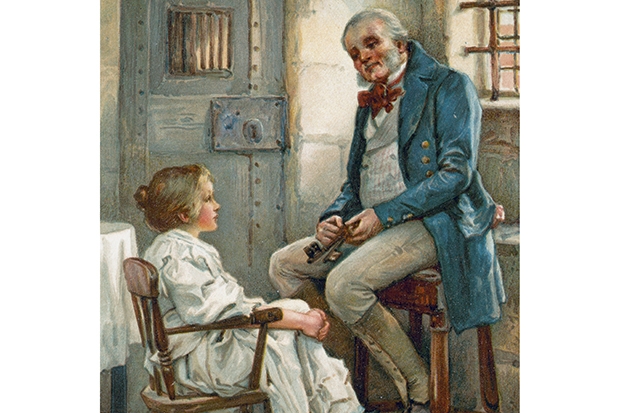The Marshalsea was the best and worst place for a debtor to be imprisoned. From 1438 until its closure in 1842, there was dishonour in its name, contagion in its air and cruelty in its very premise: once detained, debtors could take no action to improve their lot. Instead, imprisonment was meant to serve to ‘rally friends and family’. Where none were forthcoming, many inmates died of starvation. The ancient barbarity of the system was redressed in 1729 when an inquiry revealed that medieval instruments of restraint were still in use — as well as a 3ft-long whip that terrified the debtors, fashioned out of ‘a bull’s pizzle, dried as hard as teak’.
Even after the prison’s reform it was a death sentence to be on the ‘common side’. But on the ‘master’s side’, better-off inmates found themselves in comfortable purgatory. More than any other prison, it seems to have bred camaraderie, offering ‘festive meetings in seasons of gaiety and opulence’ (as a report in 1815 found) and even a sense of peacefulness, summed up by the lassitude of William Dorrit, played by Alec Guinness in the wonderful 1988 adaptation of Little Dorrit. Known as the ‘Father of the Marshalsea’, he is permanently clad in his dressing gown, preserved beyond his creditors and other such worldly cares, indulged by visitors and mothered by his daughter.
He is a version of John Dickens, of course, imprisoned there in 1824, when his son Charles was 12. In this excellent, detailed book, Jerry White sensitively traces Dickens’s relationship with the Marshalsea, from his first childhood encounter with it in the pages of Smollett’s Roderick Random (an adored book he was forced to pawn) to his later struggles with the constitutionally insolvent John Dickens, who hoped his successful son’s publishers would pick up his debts. Incensed, Dickens placed an advert against him in all the leading London newspapers, warning that bills placed by ‘certain persons bearing or purporting to bear the name of our said client… will not be paid’.
Dickens could never speak easily about the Marshalsea, and his autobiographical writings on it, given to his biographer, were lost except for a fragment. But The Pickwick Papers, The Old Curiosity Shop, David Copperfield and of course Little Dorrit are all rich with the pathos and comedy of debt culture, such as the antics of Dick Swiveller, blocked from walking down streets where his creditors have shops: ‘There’s only one avenue to the Strand left open now, and I shall have to stop that up tonight with a pair of gloves.’
Debt then was personal, and had what Jerry White calls ‘spatial consequences’, such as the impunity of ‘Sunday promenaders’ (bailiffs were not allowed to make arrests on a Sunday) and cat-and-mouse games on Whitehall steps and other ancient debtors’ redoubts. Today’s automated credit ratings and toxic online lenders are certainly less useful for novelists.
White raises many long-dead Marshalsea voices — the claims of outrageous conmen and conwomen; the excruciating begging letters of imprisoned curates. There is particularly strong material from the diaries of one John Baptist Grano, a talented musician and composer who played with Handel before falling into debt due to his ‘fatal aspirations to gentility’. In the Marshalsea he learned to call it, in the slang of those inside, ‘this enchanted Castle’, or ‘college’ (partly an ironic reference to its dusty quadrangle) and the prisoners ‘collegians’. Grano played shuttlecock, found good company, ate well, and drank even better.
After dinner we Smoak’d a Pipe and a very handsome bowl of Punch was set on the table and when that was empty’d…’twas time to go to Supper, as accordingly we did; and after Supper we had a Bowl of the same Magnitude and was so extream Merry Singing and Telling of Stories that I was never happier in my Life…
This predates Dickens’s myth-making. The facetious praise of the institution (Grano calls the female inmates ‘Nymphs’) and the air of contentment among desperadoes was already a real sub-culture, which fed Dickens’s imagination. Poor Grano spent 16 months there, even becoming godfather to one of the turnkeys’ children, but when he left, it seems his thriving career was over, as short of one gig in Bath in 1732, nothing more of him can be discovered.
White, a great historian of London, ably untangles the afterlife of the Marshalsea buildings and identifies that, despite extensive bombing in the area, it was actually between 1968 and 1970 that John Dickens’s Marshalsea (opened 1811) was demolished by the newly established Borough of Southwark, to make way for — oh the irony — the Southwark Local Studies Library. But one wall remains, and White has done a fantastic job of restitution, so that we too, like Dickens returning there, may feel ourselves ‘among the crowding ghosts of many miserable years’.






Comments